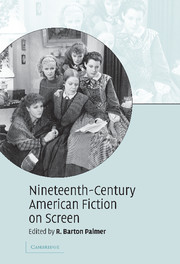Book contents
- Frontmatter
- Contents
- List of illustrations
- Notes on contributors
- Acknowledgments
- Introduction
- 1 A very American fable: the making of a Mohicans adaptation
- 2 Romancing the letter: screening a Hawthorne classic
- 3 The movies in the Rue Morgue: adapting Edgar Allan Poe for the screen
- 4 Readapting Uncle Tom's Cabin
- 5 Screening authorship: Little Women on screen 1933–1994
- 6 Melville's Moby-Dick and Hollywood
- 7 Screening male sentimental power in Ben-Hur
- 8 John Huston's The Red Badge of Courage
- 9 Translating Daisy Miller
- 10 Jane Campion's The Portrait of a Lady
- 11 The Europeans – and the Americans
- 12 Sister Carrie becomes Carrie
- 13 Hollywood and The Sea-Wolf
- 14 An untypical typicality: screening Owen Wister's The Virginian
- Filmography
- Index
7 - Screening male sentimental power in Ben-Hur
Published online by Cambridge University Press: 22 December 2009
- Frontmatter
- Contents
- List of illustrations
- Notes on contributors
- Acknowledgments
- Introduction
- 1 A very American fable: the making of a Mohicans adaptation
- 2 Romancing the letter: screening a Hawthorne classic
- 3 The movies in the Rue Morgue: adapting Edgar Allan Poe for the screen
- 4 Readapting Uncle Tom's Cabin
- 5 Screening authorship: Little Women on screen 1933–1994
- 6 Melville's Moby-Dick and Hollywood
- 7 Screening male sentimental power in Ben-Hur
- 8 John Huston's The Red Badge of Courage
- 9 Translating Daisy Miller
- 10 Jane Campion's The Portrait of a Lady
- 11 The Europeans – and the Americans
- 12 Sister Carrie becomes Carrie
- 13 Hollywood and The Sea-Wolf
- 14 An untypical typicality: screening Owen Wister's The Virginian
- Filmography
- Index
Summary
“The best books live by the appeal they make to the heart, even more than by the appeal they make to reason … [T]hey trouble the waters of sympathy within us, and keep them from stagnation.”
– W. J. Dawson, The Making of Manhood (1890)Just such an appeal to the heart has made former Union General Lew Wallace's novel Ben-Hur a literary, stage, and film phenomenon for more than 120 years. In fact, as the historian Victor Davis Hanson observes, this was a book like no other previously published in America:
Wallace's novel began the strange nexus in American life, for good or ill, between literature, motion pictures, advertising, and popular culture. The novel led to the stage and then to the movies, but in the process it spun out entire ancillary industries of songs, skits, ads, clothes, and fan clubs, ensuring that within fifty years of its publication, nearly every American had heard the word “Ben-Hur” without necessarily ever reading the book.
When published in 1880, however, and long before it became a cultural phenomenon, Ben-Hur astounded and inspired readers with its pious affect. For many, it was probably the first and only novel they ever perused; such readers in fact considered it less an entertaining fiction and more a devotional text with which they could, and did, connect in a spiritually uplifting fashion.
- Type
- Chapter
- Information
- Nineteenth-Century American Fiction on Screen , pp. 106 - 132Publisher: Cambridge University PressPrint publication year: 2007



